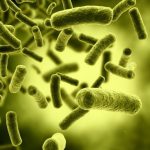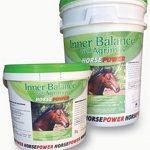Dr David Wood BVSc, MRCVS
 Prebiotics are specialised feed ingredients which encourage changes in the gastrointestinal micro flora, altering their composition and / or activity in a way that benefits the horses well being and health. In themselves they are indigestible compounds but through their activity on living organisms in the gut, the microbiome, they can influence feed digestibility. Prebiotics are distinct from Probiotics which comprise cultures of living or dead microorganisms.
Prebiotics are specialised feed ingredients which encourage changes in the gastrointestinal micro flora, altering their composition and / or activity in a way that benefits the horses well being and health. In themselves they are indigestible compounds but through their activity on living organisms in the gut, the microbiome, they can influence feed digestibility. Prebiotics are distinct from Probiotics which comprise cultures of living or dead microorganisms.
Prebiotics are often derived from special fermentation techniques and comprise more or less complex carbohydrate including Mannan Oligopolysaccharide or “MOS” products derived from the wall of yeast cells. This group of compounds is the subject of much research and has been used by the animal production industry for many years, though it is only recently gaining broader acceptance in the horse world. In pigs and poultry for example, Prebiotics are commonly used to help maintain overall health and immunity to disease, and improve feed conversion efficiency.
How do they work?
The chemical structure of Prebiotics such as the MOS group mimics that of the cells lining the intestine. Pathogenic bacteria such as Salmonella or certain strains of E.coli normally attach to these lining cells and cause damage and cell death. In the presence of MOS these same bacteria become chemically bonded to the MOS instead of the gut lining and are thereby inactivated. These inactivated bacteria can then become a food source for other, beneficial micro flora present in the gut, helping to stimulate their growth and so shifting the balance between desirable and undesirable organisms. Basically knocking off the baddies and feeding them to the goodies. Clever stuff!
The balance of micro organisms in the horse’s intestine is critically important for several reasons;
- Overgrowth of certain bacteria can cause problems such as excess gas formation or inflammation of the gut wall, in turn resulting in symptom of colic and diarrhoea.
- Excess production of acid from acid producing bacteria can upset the pH balance, damage the gut lining, and produce digestive problems as well as signs such as nervousness, loss of appetite and failure to properly thrive. Hind gut ulceration with low grade chronic pain may result in girthing problems, teeth grinding and reduced performance.
- Toxins produced by certain pathogenic bacteria can be absorbed into the bloodstream causing problems ranging from mild liver damage to acute laminitis.
- If the balance is abnormal, even slightly, the digestion of nutrients will be adversely affected, and the horse will not be able to derive full benefit from its feed intake. Digestion of fibre feeds is largely dependant on these gut bacteria.
- Poor performance may result from myriad causes, but if a horse’s digestive system is not working well, then it’s unlikely to perform at its peak.
We know very well that the stress of high energy diets coupled with the stable environment leads to stomach ulcers in a majority of race horses in work. We know far less about the impact of these unnatural feeding and environmental factors on what is happening lower down the intestinal tract. Prebiotics and Probiotics are ways of providing some protection to the hind gut microbiome to keep it healthy which in turn helps keep the whole horse healthy too.
Some effects, such as the link between grain overload, colic and laminitis are well established. Far less well understood in horses is the more subtle influence of the constantly changing microbial balance inside the bowel, on overall health and digestion.
Immune System
It is no accident that a large part of the horse’s immune system is located in and around the gut. After all, the gut wall with its massive surface area is the interface between billions of potentially hostile microbes and the inner workings of the body. Small wonder then that the animals defence system of white blood cells, lymph nodes and drainage channels is concentrated here in what is effectively the main front line between the outside and the inside worlds. It’s fair to say that the overall health of a horse’s immune system revolves around the health of the parts involving the gut. Anything we can do to assist it in the continual battle against invasion by pathogens has to be a good thing.
Horse feed, especially forage feeds but also some grains, can play host to another range of potential pathogens – fungi which produce toxins. These Mycotoxins can produce a range of illnesses from sub-clinical to severe, and include some related to gut damage such as colitis. The volcanic mineral Zeolite was first introduced to horse nutrition in Australia over ten years ago by Horsepower for its bio- available silicon content and some useful attributes as a binder of these Mycotoxins. Zeolite is now included in several Horsepower feeds for this benefit.
Major upsets to the digestive system causing symptoms such as such as colic and laminitis are easily seen, but the subtle benefits afforded by the optimum balance of gut microflora are not so easy to quantify in horses. A 5% improvement in feed conversion which would have a poultry producer dancing with delight would probably pass unnoticed by most horse owners. Nevertheless, Prebiotics have earned a place in equine nutrition.
 The new product from Horsepower called “Inner Balance” combines the proven MOS Prebiotic, “Agrimos”, with Zeolite as well as botanical extracts to promote a healthy balance of intestinal microflora and also providing some mycotoxin protection help maintain or re- establish a beneficial gut flora and optimise digestive health.
The new product from Horsepower called “Inner Balance” combines the proven MOS Prebiotic, “Agrimos”, with Zeolite as well as botanical extracts to promote a healthy balance of intestinal microflora and also providing some mycotoxin protection help maintain or re- establish a beneficial gut flora and optimise digestive health.

